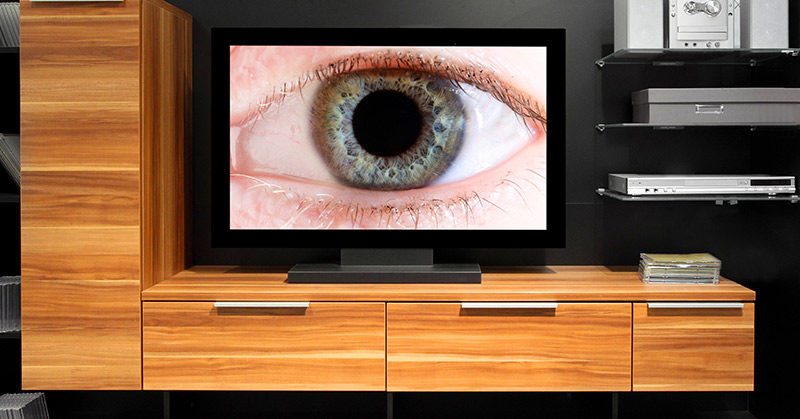This article was originally published on August 20th, 2020, and has since been updated.
With the rise of technology and social media, privacy seems to be harder to maintain. However, it’s one thing to choose to post about your life on Instagram or Facebook, and quite another to be spied on without your consent.
Many people joke about being spied on through their gadgets, but in truth, that theory may not be far off. The FBI warns that smart TVs that connect to the internet might be watching you back.
Your Webcams Could Get Hacked, Even Through Smart TVs
You may have seen people with bits of tape covering their phone and laptop cameras. This is to protect themselves from hackers who could take control of the webcam and disable the “on” light. Then their victims are completely unaware they are being watched. Most of the attacks are unaccounted for and the victims never realize they had been compromised.
When computers are shut off, they can’t be accessed by hackers, but most people leave them in hibernation or sleep mode where the cameras could still be turned on. Even Mark Zuckerberg covers his webcam and his microphone.
Financial gain through gathering information is usually what motivates these cybercriminals. (And usually not capturing images for blackmail or for their own creepy personal use.) [1]
The same motivation applies to smart TVs as well. A TV connected to the internet with easy access to streaming services comes with a downside. The TV may be able to collect data so advertisers could target their marketing.
FBI Warns That Hackers Could Enter Your Home Through Smart TVs
The FBI says that many people with smart TVs don’t take the same protective steps as they would to their phones and computers, such as putting tape over the webcam, using complicated passwords, etc. But they should.
“Beyond the risk that your TV manufacturer and app developers may be listening and watching you, that television can also be a gateway for hackers to come into your home,” the FBI says in a press release. “A bad cyber actor may not be able to access your locked-down computer directly, but it is possible that your unsecured TV can give him or her an easy way in the backdoor through your router.”
Many smart TVs come with built-in cameras that use facial recognition to suggest programming based on who’s watching. It also allows for live two-way conversations on the large screen. The TV responds to voice commands for those who are too lazy to pick up the remote—or those who could never find it.
In a nightmare scenario, according the FBI, cybercriminals “can turn on your bedroom TV’s camera and microphone and silently cyberstalk you.”
“At the low end of the risk spectrum, [hackers] can change channels, play with the volume and show your kids inappropriate details.” [2]
Instances When Smart TVs’ Security was Vulnerable
When concerns about the government using smart TVs to spy on its citizens arose in 2017, WikiLeaks published some chilling information. A tool developed by the CIA called “Weeping Angel” attempted to turn some Samsung smart TVs into monitoring devices. Weeping Angel would have been able to extract browser search history and Wi-Fi credentials. And when a TV turned on, Weeping Angel “kept it in a deep standby mode, listening and waiting,” according to Tech Crunch.
In 2018, Consumer Reports found that millions of smart TVs have security flaws that are easy to exploit. White hat hackers showed how bad cyber actors could simply take over a device.
In 2019, Samsung tweeted a reminder to owners of its smart TVs to scan their product for viruses to “prevent malicious software attacks.” They deleted the tweet after major backlash. [3]
All of this shows that the capabilities of overriding the human right to privacy can be, and are, being abused.
How to Maintain Internet Security on Smart TVs
The FBI insists that people need to make security a top priority, especially with the growth of internet-enabled streaming and satellite dish services. Do research before buying a smart TV and decide whether you could minimize the risks as much as possible.
If you buy one or already have one, ensure you know everything about its features and how to control them. Do an internet search of your TV model number while adding keywords like “privacy,” “microphone,” and “camera.”
Here are a few more tips from the FBI:
- Don’t rely on default security settings. If it’s possible, change passwords. Learn how to turn off microphones, cameras, and any other method of taking personal data.
- Place a piece of black tape over the camera lens if you can’t turn off the camera.
- Check how often the manufacturer updates the smart TVs with security patches.
- Read the privacy policy of the TV manufacturer and whichever streaming service you use. Know what kind of data do they collect, how they use it, and how they store it to keep their system safe from hackers. [4]
Sources:
- “Now More Than Ever You Need to Cover Phone And Laptop Cameras, Says Security Expert.” David Cook. Science Alert. April 19, 2020
- “Oregon FBI Tech Tuesday: Securing Smart TVs.” FBI. November 26, 2019
- “FBI Warns That Your New Smart TV Could Be Used to Spy on You.” Kristin Houser. Futurism. December 2, 2019
- “Smart TVs May Be Watching And Listening In Your Home, FBI Warns.” Beth Dalbey. Patch. December 2, 2019

